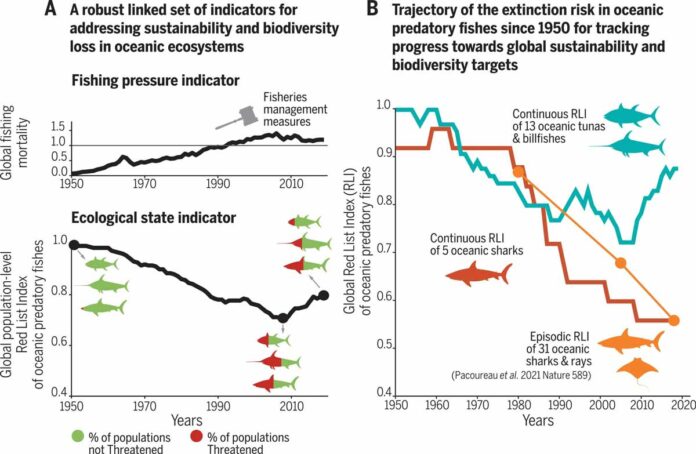Some tunas and billfishes are recovering from decades of overfishing. Thanks to successful fisheries management and conservation efforts. But shark biodiversity continues to decline. This is according to a new study examining yearly changes in these species’ extinction risk over the last 70 years. The findings demonstrate the importance of conservation and management in protecting large ocean species. It also emphases the urgent need for these safeguards to be extended to sharks.
It is estimated that intense fishing across the world’s oceans overfished roughly half of all commercially harvested fish. It also invertebrated stocks during the twentieth century. This includes iconic large predatory fishes like tuna, billfishes, and sharks. While intense fishing activity is increasingly being monitored and managed, the long-term effects on ocean biodiversity are generally unknown.
Maria José Juan-Jordá created a continuous Red List Index (RLI) of yearly changes in extinction risk of oceanic tunas and sharks. This is spanning the last 70 years based on International Union for Conservation of Nature (IUCN) Red List categories. It will help to understand the health of oceanic biodiversity and the impacts of fishing mortality and conservation efforts on these populations. Juan-Jordá et al. discovered that, after more than a half-century of increasing extinction risk due to increased fishing pressure, effective fisheries management and conservation strategies have allowed tuna and billfish populations to recover over the last decade.
However, the extinction risk for sharks, which are largely unmanaged, is increasing. Target species are increasingly and successfully managed to ensure maximum catch. But other functionally important species, such as sharks, continue to decline due to insufficient management actions.
In a related Perspective, Matthew Burgess and Sarah Becker write, “The conservation statuses of threatened target species can be improved by managing the fishing industry. It can benefit the industry economically in the long run while allowing the threatened species to recover.” “However, protection of high-vulnerability bycatch and nontarget species is expected to be more difficult. Because it will necessitate fisheries investing in better fishing gear and targeting practises. Or reducing fishing efforts, without directly benefiting from these changes.”

